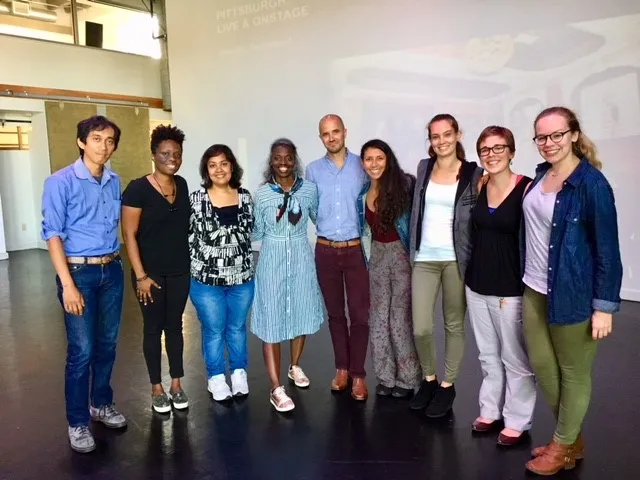Teaching Public Humanities at Pitt

Kubis’ Introduction to the Public Humanities class visits the Kelly Strayhorn Theater in Pittsburgh, PA.
When academics talk about “engaging with the public,” it sometimes reminds me of that New Yorker illustration “A View of the World from 9th Avenue,” where Manhattan appears up-close and detailed and the rest of the world stretches out beyond that in a vast undifferentiated landmass.
Yes! Academics should try to connect their work to people outside of their profession. But who are these people? How do we find them? How do we know when we’ve “connected” with this elusive “public”?
My Introduction to Public Humanities graduate seminar at the University of Pittsburgh takes these questions as starting points and answers them by working through institutions. The humanities, as many of us know by now, don’t only live in universities. But that doesn’t mean they take the same shape or work in the same way at the institutions that support them. So how can universities work with museums, libraries, performance spaces, and literary organizations to promote the reflection and deep thinking that characterize the humanities, wherever they exist?
Each week, the seminar visits a local cultural organization or hosts a visitor to talk about the ways the humanities function in various local and national organizations, in addition to thinking about how they connect to universities and each other. Our visit to the Kelly Strayhorn Theater is pictured above. We also host guests or visit units at Pitt outside the humanities like the schools of business and public health—places that often seem as foreign as external institutions, as foreign as Staten Island to Manhattanites.
Students in the class are responsible for writing a short piece intended for a public audience and for designing a public-facing project. The projects vary widely based on the students’ interests and their pre-existing relationships with community organizations. The writing also varies greatly, both in tone and content, signaling the many different forms that the public humanities can take.
The seminar contributed to a growing public humanities community at Pitt. In March of 2019, a few months after the seminar ended, Pitt hosted an event to showcase some of the community engagement efforts happening on campus. Most of the usual suspects were there, like the Schools of Public Health, Social Work, and Education. But several of us from the Introduction to Public Humanities were also there, with a poster and a zine introducing attendees to the public possibilities of the humanities.
I first offered the course in fall 2018 and will offer it again in fall 2020. The COVID-19 pandemic will make it difficult or impossible to visit institutions or host guests. Like most community engagement efforts, we’ll need to be flexible in working with our partners. The urgency of the Black Lives Matter protests encourages us to look for ways to use our class to address systemic racism and injustice, and I look forward to having the class participate in Pitt’s Center for African American Poetry and Poetics’ week of Black Study from September 28-October 2 as part of this effort.
The pandemic and global protests surrounding race and police brutality underscore the importance of the public humanities and of thinking about the role that intellectual work plays in the world outside the university. They also remind us that public engagement is a complicated, everchanging effort—one I look forward to undertaking with my students this semester.
Dan Kubis is a senior lecturer in English at the University of Pittsburgh and host of the Being Human podcast.
Learn how to contribute to the Humanities for All blog here.